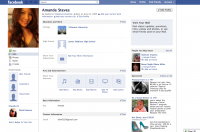Serendip is an independent site partnering with faculty at multiple colleges and universities around the world. Happy exploring!
Reply to comment
Remote Ready Biology Learning Activities

Remote Ready Biology Learning Activities has 50 remote-ready activities, which work for either your classroom or remote teaching.
Narrative is determined not by a desire to narrate but by a desire to exchange. (Roland Barthes, S/Z)
What's New? Subscribe to Serendip Studio
Recent Group Comments
-
Kayla White-Lee (guest)
-
Soccer 35 (guest)
-
heera (guest)
-
rubikscube
-
Serendip Visitor (guest)
-
TiffanyE
-
ekthorp
-
ekthorp
-
MissArcher2
-
jlebouvier
Recent Group Posts
A Random Walk
Play Chance in Life and the World for a new perspective on randomness and order.
New Topics
-
10 weeks 6 days ago
-
11 weeks 3 hours ago
-
11 weeks 3 days ago
-
11 weeks 3 days ago
-
11 weeks 3 days ago


Facebook Failure
Fake facebook identity no.2>
So, I started doing a project on Facebook by creating fictitious profiles and seeing how I portray these characters correlates with the different interactions I'd get after sending out mass "friend requests". I wanted to do this as a study of the projection of information in the virtual world and how this information would be interpreted by others (ie, playing different gender and identity roles in those profiles). Would I get more male hits for a female profile? more female hits for a male identity? I soon found this little experiment to be a failure after arriving at the realization that, surprisingly, the creation of false identities online can be extraordinarily conflicting and create a sort of moral dilemma. I just couldn't bring myself to do it! I was lying to the world and to these poor "friends" of mine! I found it to be increasingly uncomfortable to continue on and play these characters I had created. I found myself at a moral crossroads - is it ethical to create this online persona which doesn't even exist? Amazingly, it was incredibly easy to construct these fake profiles - so easy that it was a bit scary. The whole process reminded me of a movie I had watched a while ago called Catfish. In the movie, a photographer forms a relationship with a young painter named Abby (8 years old) on Facebook. she sends him her paintings and tells him all about her gallery and artwork. This photographer, Nev, then notices Abby's 19 year old sister online and after friending her, she becomes his love interest. Finally Nev decides to meet the family in person and drives halfway across the country to surprise them. In the documentary, It is discovered that all of these people don't even exists and that the creator of their profiles is one strange woman who apparently has psychological problems. I discovered through my attempted project that I would personally find this to be a very difficult feat, psychologically. It makes me wonder how people feel about creating online personae which differ from their real-life world. Here is one of the profiles I had created (since deactivated) and my weekly post in place of the project.
Although I cant help to think about where this might have led after getting the profiles to interact with one another and create a network of characters that outsiders would be drawn to. I would have gone one to create more male characters, since the two I started out with were both female.
ps, I think we should watch the movie in this class!
Intersections of the Panel Discussion
Several presentations had a theme which involved spanning several areas of study or several personae. Cyberpunks span the boarder between high-tech and low-life, psychiatrists between social sciences and hard sciences, Facebook users -between the real world and the virtual world, midwives - as being not physicians, but practitioners who often employ novel techniques and council mothers-to-be, female science fiction writers - who often used male names in order to sell their work. I found it striking that so many of these groups contain individuals who employ multiple identities in their careers or lives. It makes me think of there being a correlation with leamirella's post in that we all, to some degree, inhabit different identities which we can switch on or off at any given time in our daily routine. it is kind of a similar concept that groups of people - like psychiatrists for example - can use their intermediate stance in the sciences to their benefit. Because they lie between the social and hard sciences, they have a training in both and can council patients and also prescribe medications as a doctor, depending on the given situation. I think that the panelists above used intermediary identities to their advantage in creating a hybrid identity all their own.